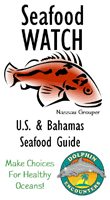FREE SEAFOOD WATCH GUIDE HELPS BAHAMIANS
MAKE HEALTHY CHOICES FOR HEALTHY OCEANS
BAHAMAS
FREE SEAFOOD WATCH GUIDE HELPS BAHAMIANS
MAKE HEALTHY CHOICES FOR HEALTHY OCEANS
 BLUE LAGOON ISLAND – Bahamians depend on marine resources for food, recreation and employment. The choices we make today on the seafood we eat will have a significant impact on our resources in the future. Dolphin Encounters has created a Seafood Watch Guide that has listed the best seafood choices to make and which seafood should be avoided based on the season, the way it was caught or farmed, or whether it contains mercury or other contaminants.
BLUE LAGOON ISLAND – Bahamians depend on marine resources for food, recreation and employment. The choices we make today on the seafood we eat will have a significant impact on our resources in the future. Dolphin Encounters has created a Seafood Watch Guide that has listed the best seafood choices to make and which seafood should be avoided based on the season, the way it was caught or farmed, or whether it contains mercury or other contaminants.
The recommendations which list both Bahamian and U.S. seafood choices were compiled in conjunction with the Bahamas Reef Environment Educational Foundation (BREEF) and the
Monterey Bay Aquarium and Foundation.
“The Seafood Watch Guide was created to help all consumers of local or foreign seafood make educated decisions about what they are eating and buying,” said Ranaldo Smith, Education Supervisor for Dolphin Encounters. “It is important that each of us know what is plentiful and available in our marine environment and when we can and cannot consume certain seafood based on spawning seasons or other factors. Decisions we make today can seriously impact the sustainability of Bahamian Fisheries.”
The free Seafood Watch guide lists the following seafood as some best choices available locally that will ensure the support of the healthy management of our marine resources:

BEST CHOICES OF SEAFOOD IN THE BAHAMAS
Spiny lobster (August 1st – March 31st)
Stone Crab (October 16th – May 30th)
French or Blue-Striped Grunts
Yellowtail Snapper
Margate Snapper
Mutton Snapper
Gray Snapper
Mahi-Mahi
Goggle-Eye
Lionfish
BAHAMAS ALTERNATIVES
Nassau Grouper (March 2nd – October 31st)
Queen Conch (mature-formed lip)
Mackerel Fish
Bar Jack
BAHAMAS AVOID
Spiny Lobster (April 1st – July 31st)
Stone Crab (June 1st – October 15th)
Nassau Grouper (November – March spawning season,
Closed season December 1, 2008 – February 28, 2009)
Turtle (meat and eggs)
Horse-Eye Jacks*
Spanish Lobster
Dolphin Fish
Barracuda*
Swordfish*
Bonefish
Wahoo
Shark
*Limit consumption due to concerns about mercury or other contaminants |
“We all have a role to play in supporting and preserving our marine resources,” said Charlene Carey Environmental Educator for the Bahamas Reef Environment Educational Foundation (BREEF). “By avoiding certain seafood during closed seasons - such as the Nassau Grouper, its closed season began on December 1st and continues until March 1, 2009 - we guarantee that we will have our favourite seafood well into the future. Our actions can affect the long-term health of our economy and our marine resources. The guide is a simple way to remind consumers of the best choices and when to avoid eating certain species.”
The Nassau Grouper is spawning and will continue to do so until the beginning of March. As it is closed season, Bahamians are looking for other choices and lionfish is rapidly becoming a favourite. Lionfish are an invasive, non-native species that are rapidly reproducing in our waters. They are voracious predators, competing with our local fish for food and consuming some of our valuable fishery species. Lionfish have very few predators, although Nassau grouper have been known to eat them. Targeting the lionfish as a food fish would help to combat this threat to our marine environment. It is important however to use caution when catching Lionfish spines are venomous but the fish can be safely handled once the spines have been removed.
The free Seafood Watch Guide is available at Dolphin Encounters, BREEF, The Bahamas National Trust, Bahama Divers, Stuart Cove’s, Pirates of Nassau and the Friends of the Environment in Abaco.
“To date, over 5,000 guides have been distributed and have been very well received,” added Mr. Smith. “The public has remarked about how convenient they are, how easy to understand and they appreciate that the closed seasons are marked. Many use them at restaurants to look for the best choices of seafood as the guide also contains the best choices for U.S. seafood. It is encouraging to see that most people really want to do their part and to make the right choices regarding what is best for our precious marine resources. The guide is a simple and effective way to help with those choices.”
To learn more about the closed Nassau Grouper season visit Bahamas Reef Environment Educational Foundation’s (BREEF) website www.breef.org. Visit www.dolphinencounters.com to download a copy of the free Seafood Watch Guide .
.

